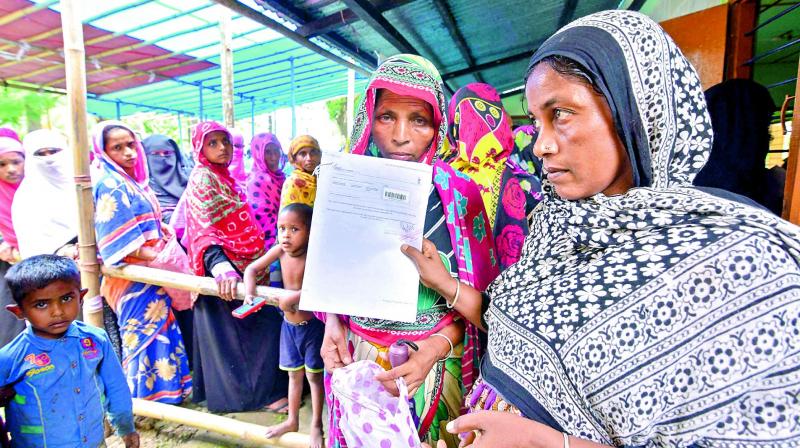NRC and the nativity test in Assam
There are instances of people who were declared as illegal migrants by foreigners tribunals finding their names in the draft NRC.

The inhabitants of Assam have now reached the penultimate stage of their nativity test with the publication of the final draft National Register of Citizens (NRC) on July 30. A little more than four million people, almost the size of the total population of Panama or Georgia, have been left out of the draft NRC. Both the Supreme Court, that is monitoring the mega NRC exercise that began in 2015, and the government have made it clear that all those people whose names have not figured in the draft NRC will have the opportunity to file claims. Besides, there is a provision to file objections against anyone whose nationality could be a matter of doubt. The claims and objections process starts on August 30 and ends on September 28. Until this process is over and the final NRC published, no adverse action can be initiated by anyone against these four million people like referring their cases to the foreigner determination tribunals or sent to detention centres.
Now briefly, why is this NRC exercise only in Assam, that has cost the government a whopping Rs 1,220 crores? The genesis of this process, which is Independent India’s biggest enumeration exercise in any single state, lies on the fear that Assam’s indigenous population was indeed facing a threat of being overwhelmed by hordes of illegal migrants from neighbouring Bangladesh who had infiltrated over the years. And, to determine who is a native and who is an alien, the cutoff date of March 24, 1971 was agreed upon while updating the NRC. This cutoff date has been derived from the agreed date in the Assam Accord of 1985 for detection and expulsion of illegal migrants which had brought the curtain down on the six-year-long anti-foreigner (read anti-Bangladeshi migration) movement of the 1980s.
For the past four decades, Assam has been a witness to the murky politics of citizenship. One of the BJP’s major charges against the Congress in Assam has been that it was protecting the migrants because they were a bulk votebank. In this backdrop, it was not surprising to find the NDA government at the Centre push ahead with the unimplemented decision to go for updating the NRC in Assam that was last listed in 1951. The idea was to free Assam of illegal migrants, and for this it was necessary to have a list of citizens first. The uproar in Parliament all this week, and the shrill, even hysterical statements by leaders like West Bengal CM Mamata Banerjee that it could lead to a “civil war” situation is not surprising. While the Congress’ main contention is that the four million (or 40 lakh) people not finding their names in the draft NRC is unacceptable as it was a rather high figure,
Ms Banerjee is arguing that the names of genuine citizens have been left out and that Indian nationals were being now forced to turn refugees in their own country.
Assam on its part has been extra-quiet on this as those left out want to go through the motions of filing claims and objections before thinking of anything else at this juncture. But several questions have arisen, both within government and civil society circles. There are instances of people who were declared as illegal migrants by foreigners tribunals finding their names in the draft NRC. On the other hand, many people belonging to indigenous ethnic groups, generally regarded as “sons of the soil”, have not found their names in the list. There is also the odd instance of some family members of former President Fakhruddin Ali Ahmed not making the cut to the draft NRC. The big question, however, is what can the government do with those people who will eventually be left out of the NRC after the entire appellate process gets over.
What must be understood is that the NRC exercise is conducted in accordance with the provisions of the Citizenship Act, while to finally declare anyone to be a non-citizen, that is a foreigner, the verdict has to come through a judicial process in accordance with the Foreigners Act. And, we are aware of the various provisions under which an individual can lawfully lay claim to citizenship. Assuming that 50 per cent of the four million people are finally left out of the NRC, what could happen to them? If their cases are to be decided by foreigners’ tribunals, one can imagine the time the process could take in view of the enormity of the figure. Meantime, can these people be kept in detention centres? The answer is no, because Assam has only six detention centres now and that too attached to existing prisons. The Centre has recently sanctioned an amount of Rs 46 crores to build a standalone detention centre for foreigners, but that facility will have a capacity of just about 3,000 people.
So can the government deport these people to their country of origin? Well, for that, their country of origin will first have to be established. If we assume that they are from Bangladesh because that is the country with which Assam and other northeastern states share porous borders, will Dhaka simply take them in? The answer again is a clear no, because Bangladesh and India has no repatriation treaty so far and they will not accept anyone in without going through their own verification process. So, will these people become India’s responsibility for all time to come, or at least for a long time to come? The answer perhaps is yes.
At the end of the day, therefore, Guwahati and New Delhi have lot of work to do. What the NRC has done is that Assam will now have a basic document that can be regarded as its list of citizens. This list is expected to act as a big deterrent for fresh infiltration. But to send the declared foreigners back to their country of origin will be a difficult task. Yes, New Delhi and Dhaka share an extremely cordial relationship under the leadership of Prime Ministers Narendra Modi and Sheikh Hasina. If this leads to a treaty under which Bangladesh agrees to take back some people, it will be a bonus. Otherwise, the Assam government and the Centre will have no option other than disenfranchising these people and allow them to stay on with work permits or try and disperse them across the country. The government will have its job cut out. And yes, will the NRC end the politics of citizenship in Assam for all time to come? Again, my answer will not be in the affirmative.
H09

